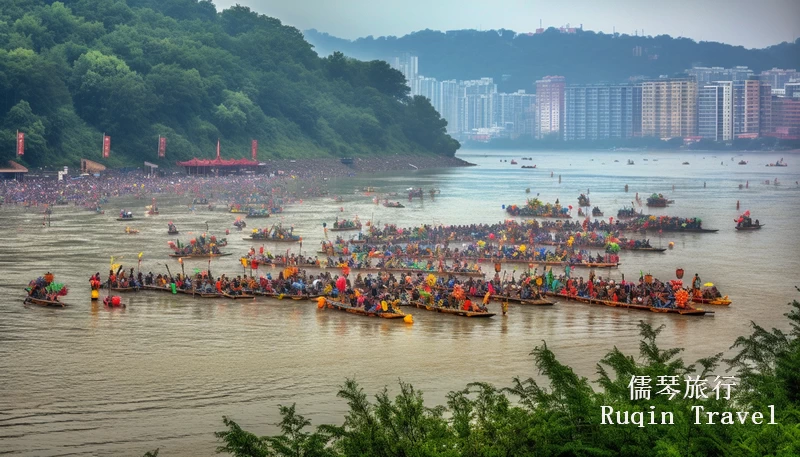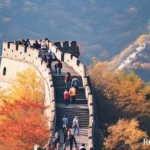Experiencing traditional Chinese outdoor festivals can be a fantastic way to immerse yourself in the local culture while enjoying the beautiful outdoors. China is rich in cultural festivals, many of which are celebrated with outdoor activities and events.
Traditional Chinese outdoor festivals often feature lively celebrations, cultural performances, and various outdoor activities. Here are a few traditional Chinese outdoor festivals:
1. Harbin Ice and Snow Festival
Held in Harbin, Heilongjiang Province, this festival (typically from January to February) showcases stunning ice sculptures and activities like ice swimming. It’s a magical winter wonderland experience but remember to dress warmly!
2. Spring Festival (Chinese New Year)
This is the most important traditional festival in China. It usually falls between late January and early February. The celebrations, which include dragon and lion dances, fireworks, and family reunions, take place across the country. The festival atmosphere is vibrant, especially in places like Beijing and Xi’an, where traditional customs are strongly upheld.
While it’s celebrated nationwide, experiencing it in rural areas or smaller towns can offer a more traditional feel. The festival begins on the first day of the Chinese lunar calendar (usually in late January or early February). Expect fireworks, lion dances, and lots of red decorations.
3. Lantern Festival
Held on the 15th day of the first lunar month, this festival marks the end of the Chinese New Year celebrations. You can witness beautiful lantern displays, lion and dragon dances, and try traditional foods like tangyuan (sweet glutinous rice balls). Cities like Suzhou and Chengdu are known for their spectacular lantern displays.
Marking the end of the Chinese New Year celebrations, this festival features beautiful lantern displays and traditional dances. Try to visit cities like Beijing, Xi’an, or Shanghai for grand celebrations, including the release of sky lanterns.
4. Dragon Boat Festival (Duanwu Festival)
Celebrated on the 5th day of the 5th lunar month, this festival features dragon boat races as its main attraction. The races are exhilarating to watch and are accompanied by traditional music and cheering crowds. Top spots to enjoy the festival include cities along the Yangtze River like Chongqing and Wuhan, as well as Hong Kong.
Celebrated on the 5th day of the 5th lunar month (usually in June), this festival is famous for its dragon boat races. Cities with significant water bodies, like Hangzhou or Guilin, offer a fantastic experience.
The highlight of the festival is the dragon boat race, where intricately designed boats, typically decorated with dragon heads and tails, are raced along rivers and lakes. Spectators gather along the water’s edge to cheer for the competing teams, creating a festive and energetic atmosphere.
5. Mid-Autumn Festival
Taking place on the 15th day of the 8th lunar month, this festival is celebrated by admiring the full moon and eating mooncakes. Many people head outdoors to parks and open spaces to enjoy moon viewing parties. The festival is widely celebrated, but Hangzhou and Guangzhou offer particularly enchanting experiences with their beautiful lake and river settings.
Occurring in late September or early October, this festival is celebrated with moon gazing, lantern lighting, and mooncakes. It’s a family-oriented festival, and you can enjoy it in almost any city or town in China.
6. Qingming Festival (Tomb-Sweeping Day)
On the 4th or 5th of April, this festival involves outdoor activities like tomb-sweeping, spring outings, and flying kites. It’s a time for paying respects to ancestors and enjoying the beauty of spring. The countryside around Beijing and the ancient city of Luoyang are excellent places to experience Qingming customs.
Also known as Tomb-Sweeping Day, it’s a time when people go outdoors to enjoy the beauty of spring and pay respects to their ancestors. It’s a unique cultural experience, often involving kite flying and picnics in the countryside.
7. Double Ninth Festival (Chongyang Festival)
The Double Ninth Festival, celebrated on the ninth day of the ninth lunar month, is known for its outdoor activities, particularly mountain climbing. It is a time for outdoor excursions and appreciating nature, with the custom of climbing high mountains to enjoy scenic views and take part in the festive atmosphere.
Each of these festivals offers a unique insight into Chinese culture and traditions. Remember to check the lunar calendar for the exact dates as they change every year. Also, consider the regional differences in how these festivals are celebrated.
While planning your trip, always be respectful of local customs and participate in a way that’s considerate to the environment and local communities. Enjoy your cultural adventure in China!
If you have any questions or queries, then please feel free to drop us a line.



